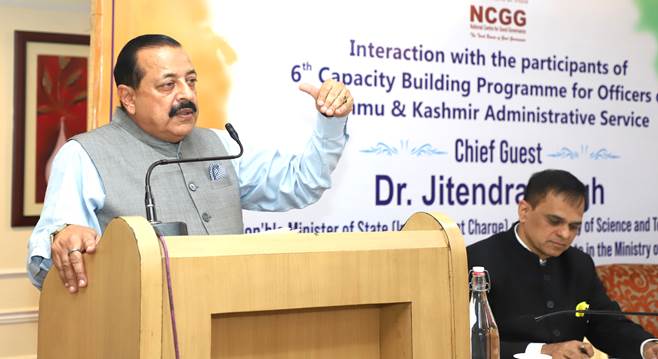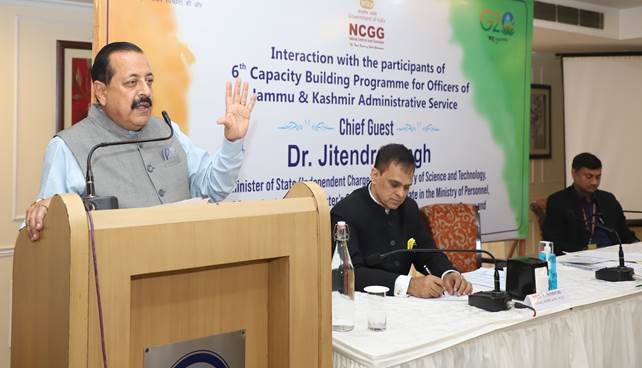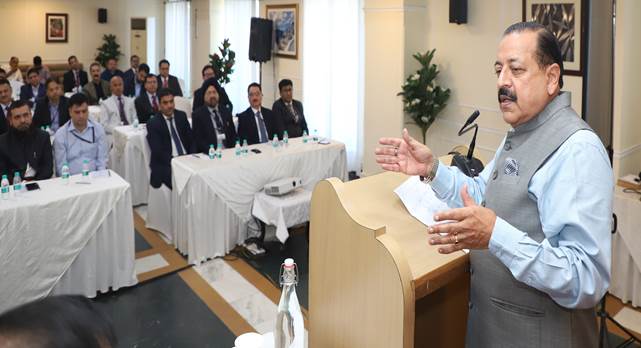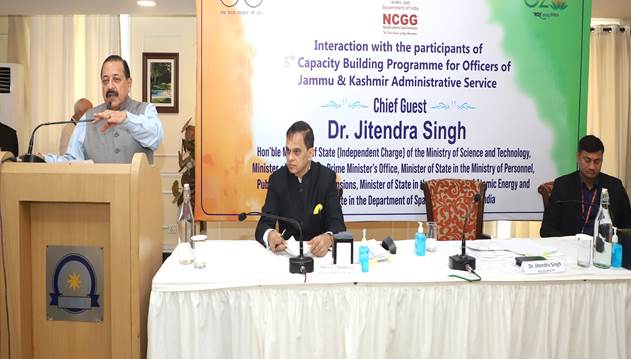
Union Minister of State (Independent Charge) Science & Technology; MoS PMO, Personnel, Public Grievances, Pensions, Atomic Energy and Space, Dr Jitendra Singh today asked the Officers of Jammu and Kasmir Administrative Services to adopt” Whole of Government” approach in Governance, as the days of working in silos have gone.
The Minister asked the officers to identify the schemes having commonality and adopt an integrated approach of execution of schemes for better efficiency and result, benefitting the common man.
Dr Jitendra Singh was addressing the 6th Capacity Building Programme for Officers of J&K Administrative Services organized by National Centre for Good Governance in New Delhi.

Dr Jitendra Singh said, there is change in the demography of Central and State Civil services due to availability of technology even in the rural and remote areas and democratization of resources. He added that due to the above twin factors, the toppers in the Central Civil Services are coming from States like Punjab, Haryana and Jammu and Kashmir.
Dr Jitendra Singh said, Prime Minister Shri Narendra Modi has special penchant for Governance Reforms and soon after taking charge in May, 2014, a number of measures were taken to streamline the administration to make it more Transparent, more Accountable and to have Citizen-Centricity.
Dr Jitendra Singh said, the public policy in our country is currently aimed at enhanced transparency and accountability in governance with focus on fiscal federalism, transforming rural India, and improving the quality of public service delivery.

The Minister said, India has improved systems of grievance redressal to make them more relevant to our times, and has tried to address any lingering sense of injustice springing from an administrative act by simplification of administrative processes and strengthening institutions. It is to this end that digital advancement has enabled citizens grievance redressal.
Dr Jitendra Singh also promised to implement Call Centre approach in J&K, currently being implemented at the Centre to personally ascertain the Satisfaction level of the Persons having redressed their grievances.
Referring to the Digital India programme, Dr Jitendra Singh said, it is centred on three key vision areas, namely digital infrastructure as a core utility to every citizen, governance and services on demand, and digital empowerment of citizens. He said, the overall goal is to ensure that digital technologies improve the life of every citizen, expand India’s digital economy, and creating investment and employment opportunities and create digital technological capabilities in India.
The Minister said, Digital India has considerably reduced the gap between Government and citizens and it has also helped in delivering substantial services directly to the beneficiary in a transparent and corruption free manner. In the process, India has emerged as one of the pre-eminent nations of the world to use technology to transform the lives of its citizens, he added.
Dr Jitendra Singh said, the new age competency of civil servants has to be anchored in ethics and accountability. Government of India has maintained a “Zero Tolerance Approach to Corruption” bringing greater transparency to government processes, enhanced supervision and severe penalties in cases of proven misconduct. India’s Legislative and Constitutional Framework to fight corruption has been greatly strengthened with mandatory declaration of assets by civil servants on an annual basis, thereby focusing on preventive vigilance, the Minister added.
Shri V. Srinivas, Secretary, DARPG said that the training is a platform for collective learning and sharing and working towards improving the quality of life. He said, there is need for accelerated and inclusive development for resilient growth and stressed on the importance of technology in transforming the lives of citizens.

Shri Srinivas said, the officials should create a conceptual framework to meet the needs and expectations of people and work for the holistic development in the State. The capacity building programme by NCGG provided a platform for collective learning and sharing, ultimately working towards improving the quality of life.
The 6th capacity building programme is being conducted from the 9th October, 2023 to 20th October,2023 at NCGG. The programme is attended by 37officers of the JKAS working in the ranks of Secretaries, Special secretaries, Additional Secretaries, CEOs, Directors, Joint Commissioners, Mission Directors among others.
During this programme, civil servants of the Jammu & Kashmir interacted with domain experts on diverse topics, viz., communication strategies, poverty elimination, Rural Housing, Skill India, Artificial Intelligence in Government, Tourism & Culture, Jal Jeevan Mission, digital India, approach to SDGs by 2030, Ayushman Bharat, anti-corruption strategies, vigilance administration, circular economy, rejuvenation of rivers, innovation & entrepreneurship, etc. among other important areas. The participants will also take for exposure visit to Indian Parliament.
The capacity building programme is scientifically tailored to equip civil servants of Jammu & Kashmir to deliver robust and seamless services to the people. The cutting-edge knowledge and new skill set acquired during this programme will help these civil servants in efficient public service delivery to improve the lives of people. The aim of this programme is to reorient officers to work with single-mindedness to improve the quality of life and create opportunities for the people. The officers are given exposure to the best practices in governance to emulate these practices of good governance, transparency and efficient service delivery in Jammu & Kashmir. The focus of the programme is on sharing the practical aspects of governance, to work with speed and scale, and be accountable to citizens and address their grievances proactively.

Dr. Des Raj Bhagat, Shri Nisar Ahmad Wani, Shri Jatinder Singh, Ms. Anoo Malhotra, Shri Hakeem Tanveer Ahmad, Mr. Riyaz Ahmad Shah, Mr. Prem Singh, Shri Tej Krishan Bhat, Shri Khwaja Nazir Ahmad, Dr. Bharat Bhushan, Shri Waseem Raja, Shri Ashok Kumar, Ms. Indu Kanwal Chib, Shri Imam Din, Shri Shabir Hussain Bhat, Shri Sham Lal, Shri Krishan Lal, Dr. Raj Kumar Thapa, Shri Kuldeep Krishan Sidha, Shri Sushil Kesar, Shri Atul Gupta, Shri Surender Mohan Sharma, Shri Tilak Raj, Shri Rajeev Magotra, Shri Devinder Singh Katoch, Shri Parveez Sajad Ganai, Shri Shafiq Ahmed, Shri Shahnawaz Shah, Shri Jahangir Hashmi, Shri Dhananter Singh, Shri Qazi Irfan, Shri Rakesh Kumar, Shri Romin Ahmad, Shri Sudershan Kumar, Shri Vevaik Puri, Shri Subhash Chander Dogra, Shri Asif Hamid Khan took part in the training programme and attended the interactive session addressed by Dr Jitendra Singh.
<><><><><>
SNC/PK

